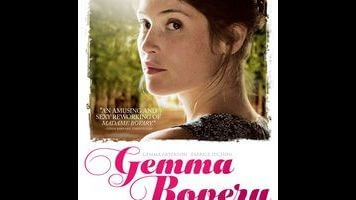Gemma Arterton may never become a big star in America, but the work of Posy Simmonds is doing its best to make her, at least, an object of fascination. Simmonds wrote the serialized comic strip Tamara Drewe, a riff on Thomas Hardy’s Far From The Madding Crowd, which was turned into a Stephen Fears film in 2010 with Arterton in the lead. Gemma Bovery reaches further back into the Simmonds archives, adapting her strip that riffs on Gustave Flaubert’s Madame Bovary. It’s a different filmmaking team (and a bilingual production this time), but Arterton remains, inhabiting a role that shares her first name and furthering the self-reflexivity of an already self-reflexive film.
Both Simmonds adaptations often avoid Arterton’s point of view, Gemma Bovery even more so than the ensemble-driven Drewe. In both cases, she plays a woman who multiple men find irresistible—echoing and intellectualizing (intentionally or not) her love-interest roles in big studio movies, where she’s played sidekick and/or romantic prize to characters as varied as James Bond, Perseus, whoever the prince of Persia was, and Ben Affleck. Here Gemma and her husband, Charlie Bovery (Jason Flemyng), move to a village in Normandy across the street from Martin Joubert (Fabrice Luchini), a local baker who loves Flaubert. Before he even lays an eye on Gemma and Charlie, he’s taken by their names’ similarity to the married couple from Madame Bovary. Martin quickly becomes convinced that their lives may be running in dangerous parallel to the events of the Flaubert novel and endeavors to help them avoid a tragic fate while not quite admitting his intense and obvious attraction to Gemma. Essentially, it’s a movie about concern trolling.
Without the broader ensemble or bright, light comic tone of Tamara Drewe, Gemma Bovery becomes a smaller, narrower movie, and a more downbeat one by design of its second-degree source. While the earlier film had a pair of funny teenage girls meddling in the affairs of various townsfolk, this one has, in their place, just Martin—a sadder sight, given that he has a seemingly long-suffering wife and son at home. Visually, too, it’s more drab. The movie looks slightly washed out, like bucolic splendor left out in a quick rain shower, then dried in the sun. It’s neither aesthetically displeasing nor particularly memorable; the best shot arrives early, when Martin goes to greet his new neighbors outside their own and the camera pulls back slowly from a semi-wide view until it’s standing across the street, shrinking the characters. Martin’s relationship with Gemma will never be quite so intimate as he thinks.
Much of the movie stays with Luchini, but Arterton proves again that she has starrier magnetism in movies that slow down enough to appreciate it, even if she winds up as much a symbol as her own person. Though it’s dodgy business to reorient a novel about a woman’s dissatisfaction around the tragedy of a nosy older man, director Anne Fontaine successfully fashions a story about how certain men see real-life women as characters, imposing narratives on them rather than engaging with them as people. Despite those self-referential qualities, Gemma Bovery doesn’t really require much knowledge of the original Flaubert; narration provides most of the necessary catch-up. Familiarity with (and affection for) a far less important text might improve the experience more: This is really a companion piece to Tamara Drewe. As such, it’s minor, clever, and essential in the specialized field of Gemma Arterton studies.









































